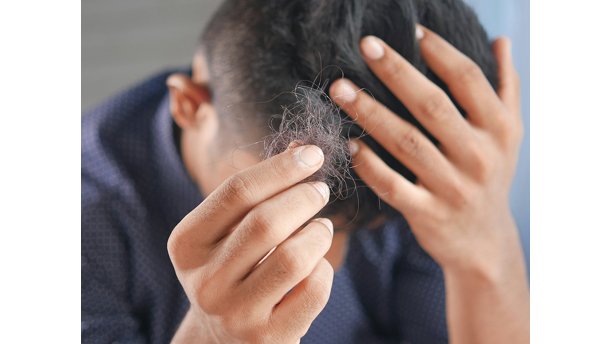
Hair loss can be a distressing experience, and understanding its common causes is a crucial step towards finding effective solutions. Among the most frequent causes of hair loss is genetics, which can lead to both male and female pattern baldness. Hormonal changes, particularly during pregnancy or menopause, might cause hair loss by altering the typical growth cycle. Medical conditions, such as thyroid disorders and autoimmune diseases, significantly impact the health of your hair. Nutritional deficiencies, especially in iron, protein, and vitamins, are common culprits that contribute to weakened hair structure and eventual hair loss. Additionally, stress plays a significant role, potentially leading to temporary shedding or prolonged hair thinning. Environmental factors and styling habits, such as excessive heat or harsh chemical treatments, can also damage the hair, making it fragile and prone to breakage. By identifying these causes of hair loss, individuals can take proactive steps towards healthier hair and minimising hair loss.
Genetic factors play a significant role in determining the likelihood of experiencing hair loss conditions such as pattern hair loss and pattern baldness, which are the most common forms of baldness associated with genetic predispositions. Pattern hair loss typically presents as a progressive thinning of hair on the scalp, often leading to complete baldness in certain areas. Pattern baldness can affect both men and women but manifests differently, with men experiencing receding hairlines and women enduring a more diffused thinning. Frontal fibrosing, a form of lichen planopilaris, is another genetic condition where hairline recession and scarring are evident. Individuals with a strong family history of fibrosing may be at a higher risk. Understanding the genetic bases of these conditions can assist in early diagnosis and intervention. Genetic factors often require personalized approaches to treatment, considering how each person's genetic makeup influences their pattern hair loss or frontal fibrosing. Therefore, recognizing the genetic components is vital for developing effective solutions to address baldness effectively.
Hormonal changes significantly impact hair health, often resulting in conditions like female pattern hair loss and alopecia. Women experiencing hormonal fluctuations due to menopause or pregnancy may notice increased hair thinning or loss. Female pattern hair loss is characterized by a gradual thinning of hair across the crown, often exacerbated by hormonal imbalances. This type of alopecia is distinct from frontal fibrosing alopecia, which leads to receding hairlines. It's crucial for females to understand how hormonal factors contribute to these conditions. Hormonal shifts amplify vulnerabilities to alopecia, making it essential to seek effective solutions. Frontal fibrosing alopecia, although displaying different symptoms, also links back to hormonal changes. Recognizing the role of hormonal activity provides insight into managing and mitigating hair loss issues in females. With increased awareness surrounding female pattern hair loss, personalized approaches can be developed. Understanding hormonal impacts is vital for creating effective strategies to combat the challenges of alopecia for those affected.
Under the topic of medical conditions, it's essential to address various scalp disorders and conditions that can lead to hair loss. A dermatologist often diagnoses these issues, which may include patchy hair loss indicative of more severe health problems. Conditions like skin cancer can sometimes affect the scalp, necessitating immediate attention from a healthcare professional. Other concerns such as extreme acne can also contribute to scalp issues, further complicating hair loss. It's not uncommon for disorders of the scalp to result in noticeable patchy areas of hair loss, affecting an individual's self-esteem. Understanding your scalp and its unique conditions is crucial to finding effective solutions to these problems. Moreover, recognizing the role that medical conditions play in hair loss can guide individuals toward appropriate care, emphasizing the importance of consulting a dermatologist when signs arise. Address these scalp and medical issues promptly to maintain a healthy hair conditions.
Nutritional deficiencies can significantly contribute to hair loss, making it essential to address these issues through a well-balanced diet. A lack of vital nutrients often leads to hair thinning and weakening. Ensuring your diet is rich in vitamins and other crucial nutrients can help combat these deficiencies. Vitamins like B12, D, and iron play a pivotal role in maintaining healthy hair follicles. For those experiencing hair loss, evaluating your diet for any missing vitamins and incorporating foods rich in these nutrients can provide effective solutions. It's also critical to focus on a varied diet to prevent potential deficiencies that may exacerbate the problem. Maintaining a balanced diet with these essential nutrients ensures your hair receives the nourishment it needs. Paying attention to both culinary choices and nutritional intake supports not only overall health but also the hair growth cycle. By addressing these nutritional deficiencies, you're taking proactive steps towards reducing hair loss effectively.
Exploring Female Pattern Hair Loss involves understanding the unique challenges female individuals face when dealing with hair loss. Unlike male pattern hair loss, female pattern hair loss, also called androgenetic alopecia, manifests in a distinct pattern, often starting with thinning hair across the top of the scalp. For many females, this condition can be particularly distressing, contributing to anxiety and affecting self-esteem. Alopecia isn't solely a male issue, and understanding its nuances can aid in effective treatment options for those experiencing pattern hair loss. Various treatment strategies can be employed for female pattern hair loss, including topical treatments, oral medications, and potential surgical solutions. Consulting with specialists who understand the intricacies of female alopecia is crucial to developing a personalized plan. Addressing the root causes and exploring innovative strategies can help manage hair loss effectively, aiming for healthier hair. When exploring pattern hair loss treatment options, it's vital to consider each female's unique experience and needs.
The psychological impact of hair loss can be profound, affecting a person's mental and emotional well-being. Losing hair might seem purely physical, but the implications stretch far beyond. For many, the emotional impact is deeply tied to feelings of self-worth and confidence. Hair loss can contribute to anxiety and depression, significantly altering one's mental state. It can also affect social interactions, as individuals feel self-conscious about their appearance, which impacts relationships and social experiences. The psychological implications of hair loss often lead to diminished esteem, where well-being is compromised. People experiencing these changes may avoid social gatherings, fearing judgment or ridicule. As such, understanding the emotional and mental implications of hair loss is crucial. Recognizing this psychological impact empowers individuals to seek support and take proactive measures. Addressing hair loss through effective solutions not only restores hair but also enhances emotional and social well-being, allowing for renewed confidence and improved quality of life.
Dealing with hair loss can significantly impact one's emotional well-being. The emotional response to hair loss is deeply tied to mental health, as individuals often feel stress and worry about their appearance. This stress can affect overall confidence, making social interactions challenging. Ensuring mental well-being is a crucial component in addressing hair loss. Emotional resilience can enhance an individual's ability to cope with the changes they experience. Additionally, focusing on mental health is vital, as prolonged worry can exacerbate stress levels, further affecting hair health. Confidence can be rebuilt by managing these emotional challenges, thus improving one's overall well-being. It's important to acknowledge that stress and emotional disturbances may affect not only psychological but also physical health, as high-stress levels can affect hair growth cycles. Seeking professional advice can aid in mitigating the effects on emotional well-being, ensuring that individuals maintain a balanced view towards both their mental and overall health as they tackle hair loss challenges.
When dealing with hair loss, it's crucial to seek expert diagnosis and obtain thorough advice. Identifying the root cause through accurate diagnosis is the first step in determining suitable treatments. During a consultation, the healthcare provider will gather detailed information regarding your hair loss patterns, medical history, and family history. This expert advice is vital, as it sheds light on the potential underlying causes, whether genetic or environmental. When should one consider seeking advice? If hair loss persists or worsens, it's time to seek a professional's advice. The NHS offers valuable resources and guidance, ensuring patients have access to expert advice, from diagnosis to treatment options. Consulting with an NHS professional provides a well-rounded perspective and ensures the advice you receive is tailored to your specific condition. Don't delay; seek a consultation promptly to explore effective solutions for your hair concerns. Relying on expert advice and accurate diagnosis is essential in addressing hair loss effectively.
When dealing with hair loss, it can be crucial to know when to seek advice from the NHS. The right time to approach the NHS for expert advice is when hair loss is sudden or accompanied by other symptoms. The NHS can provide professional consultation and assist in diagnosing the root cause effectively. Early diagnosis through NHS consultation can lead to more successful treatment outcomes. Don't hesitate to reach out for help from NHS experts if you're experiencing distressing emotions linked to hair loss. Seeking medical assistance can offer peace of mind and ensure you receive the best possible guidance. The NHS can help connect you with necessary medical interventions, should they be required, and provide continued support throughout your treatment journey. Remember, the quicker you consult with NHS experts, the sooner you can get tailored advice and help specific to your condition. Never undervalue the significance of professional medical assistance for an accurate hair loss diagnosis.
When addressing hair loss, medical interventions and therapies like finasteride, often known by the brand name Propecia, prove effective. Medical education is crucial in understanding finasteride or Propecia's role in treatment. This medication works primarily by inhibiting the conversion of testosterone into dihydrotestosterone (DHT), a key player in male pattern baldness. Clinical trials have shown that finasteride can significantly slow hair loss progression and enhance hair regrowth in some patients. Embracing finasteride or Propecia requires continuous medical consultation to monitor progress and mitigate potential side effects. Education empowers individuals to make informed decisions about medical interventions. Alongside finasteride or Propecia, clinical therapies such as low-level laser therapy and platelet-rich plasma contribute to a multifaceted treatment approach. These interventions provide more options for those combating hair loss. Consulting with healthcare professionals ensures the right combination of medical treatments and therapies, optimizing outcomes. Propecia, in conjunction with other therapies, forms a cornerstone of effective hair loss interventions
When it comes to addressing alopecia, finding innovative solutions is crucial for those experiencing hair loss. Alopecia can manifest in various forms, such as frontal fibrosing alopecia, where the hairline recedes, posing unique challenges. Luckily, innovative solutions are constantly emerging through trials that aim to combat this condition. Clinics specializing in alopecia are at the forefront of offering cutting-edge treatments and solutions. For those facing frontal fibrosing alopecia, particularly concerning is its effect on the hairline, making early intervention important. Trials conducted in these clinics often explore groundbreaking solutions aimed at halting the progression of hairline loss. With continuous advancements in innovative therapies, those affected by alopecia have hope for improved management. These trials provide valuable insights into the efficacy of the solutions being developed. As the understanding of fibrosing alopecia progresses, innovative approaches offer new possibilities for those seeking to regain control over their hairline and overall appearance, providing reassurance and effective options.
When considering effective solutions for hair loss, establishing solid prevention and management strategies is crucial. Prevention begins with understanding the root causes and creating daily habits that support healthy hair care. These habits include gentle washing, using mild shampoos, and maintaining a balanced diet rich in essential nutrients. Proper hair management involves using styling tools and products that minimize damage. By integrating prevention into your routine, you're taking proactive steps to combat hair loss. Management strategies also encompass regular scalp massages to stimulate hair growth and improve circulation. Developing a consistent hair care regimen is key in maintaining the health and vibrancy of your hair. Embrace healthy habits such as avoiding excessive heat and chemical treatments, which can weaken hair and lead to breakage. Establishing strong prevention and management strategies not only supports hair health but can also enhance confidence and well-being. With the right approach, you can create a foundation of healthy habits for long-term hair care success.







